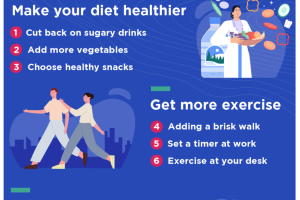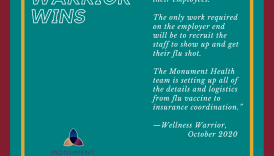Healthy Living Made Easy: Simple Tips for Busy Individuals

Importance of Healthy Living
Living a healthy lifestyle is critical, not just for physical wellness, but also for mental and emotional well-being. This approach encompasses more than just a balanced diet or regular exercise; it signifies a holistic way of approaching life. People who commit to healthy living often experience:
- Healthy Living Made Easy: Simple Tips for Busy Individuals
- Importance of Healthy Living
- Challenges for Busy Individuals
- Nutrition Tips for Busy Individuals
- Meal Prepping
- Healthy Snack Options
- Simple Exercise Ideas
- Quick Workouts
- Incorporating Activity Into Daily Routine
- Prioritizing Sleep for Health
- Importance of Adequate Sleep
- Tips for Better Sleep Habits
- Stress Management Techniques
- Mindfulness Practices
- Setting Boundaries in a Busy Schedule
- Increased energy levels
- Improved mood and mental clarity
- Enhanced immune function
- Better weight management
- Reduced risk of chronic diseases
Take Sarah, for example. Once overwhelmed by fatigue and stress, she decided to prioritize her health. After making consistent changes to her nutrition and fitness regime, her energy surged, she felt more productive at work, and she even embraced hobbies she’d long abandoned. This transformation highlights the profound impact healthy living can have on one’s quality of life.
Challenges for Busy Individuals
However, achieving or maintaining a healthy lifestyle can pose significant challenges, especially for busy individuals balancing work, family, and social commitments. The struggle is real when it comes to finding the time and motivation to invest in personal health. Here are some common hurdles:
- Time Constraints: Many find it difficult to allocate time for meal prep or exercise amid packed schedules.
- Stress and Fatigue: With deadlines looming, self-care often takes a backseat, leading to unhealthy eating habits or skipped workouts.
- Lack of Support: In hectic environments, finding a support system for motivation can be challenging.
This reality mirrors John’s experience. With a demanding job and two kids, he often opted for take-out over cooking or exercising. He felt trapped in a cycle of poor choices, reinforcing the idea that healthy living is a luxury for those who can afford the time. Understanding these challenges is essential in fostering a path toward healthier choices. Recognizing that obstacles exist allows busy individuals to seek practical solutions tailored to their lifestyles. In the next sections, we will explore actionable tips and simple strategies that can help overcome these barriers, ensuring that everyone has the opportunity to lead a healthier life.
Nutrition Tips for Busy Individuals
Meal Prepping
One of the most effective strategies for maintaining a healthy diet amidst a busy lifestyle is meal prepping. This technique involves dedicating a few hours on the weekend or a non-busy day to prepare meals for the week ahead. The benefits are countless:
- Saves Time: With pre-prepared meals, there’s no need to spend time cooking daily.
- Encourages Healthier Choices: Having healthy meals ready prevents the temptation of fast food or unhealthy snacks.
- Cost-Effective: Buying ingredients in bulk and reducing food waste can save money over time.
Take Emma, for instance. Initially overwhelmed by daily meal decisions, she started meal prepping every Sunday. She would roast a variety of vegetables, grill chicken, and cook quinoa. By only taking an hour or two each week, she created a week’s worth of balanced meals, filling her fridge with colorful containers. This simple act liberated her from daily cooking stress and improved her eating habits tremendously.
Healthy Snack Options
In addition to meal prepping, having healthy snacks on hand is crucial for busy individuals. Healthy snacks can serve as an excellent way to sustain energy levels and prevent unhealthy cravings between meals. Here are some smart snack options:
- Nuts and Seeds: High in protein and healthy fats, they are perfect for a quick energy boost.
- Greek Yogurt with Berries: Packed with protein, this combination is both satisfying and nutritious.
- Veggies and Hummus: Crunchy carrots, cucumbers, or bell peppers paired with hummus make for a deliciously crunchy snack.
- Whole Grain Crackers and Cheese: A perfect balance of carbs and protein helps keep hunger at bay.
For Chris, snacking was often a minefield of unhealthy choices. After discovering he could pack subtle flavors and nutrient density into his snacks, he began carrying zip-lock bags filled with homemade trail mix in his backpack. This small change helped him avoid vending machines and keep his energy levels stable throughout the day. By incorporating meal prepping into weekly routines and choosing healthier snack options, busy individuals can navigate their hectic schedules while still staying nourished. Up next, we’ll explore simple exercise ideas that can easily fit into any busy lifestyle, ensuring that a healthy living approach is well-rounded.
Simple Exercise Ideas
Quick Workouts
In the quest for a healthier lifestyle, finding time to exercise may seem daunting, but quick workouts can easily fit into any busy schedule. These short, intense sessions can yield significant health benefits without requiring a huge time commitment. Here are some effective quick workout ideas:
- High-Intensity Interval Training (HIIT): Short bursts of intense exercise followed by brief rest periods. For example, try 30 seconds of jumping jacks followed by 15 seconds of rest, repeated for 10-15 minutes.
- Bodyweight Circuits: Create a circuit of exercises using just your body weight. Include moves like push-ups, squats, lunges, and planks, targeting multiple muscle groups in under 20 minutes.
- Tabata Training: This is a fantastic way to squeeze in a workout in just 4 minutes! Alternate between 20 seconds of maximum effort and 10 seconds of rest for eight rounds with exercises like burpees or mountain climbers.
Nathan, a busy tech consultant, used to dread fitting workouts into his schedule. A friend introduced him to HIIT, and now he dedicates just 15 minutes each morning before work. The adrenaline rush not only energizes him but also helps him focus throughout the day. Quick workouts can shift the notion that exercise needs to be time-consuming to be effective.
Incorporating Activity Into Daily Routine
In addition to quick workouts, incorporating physical activity into daily routines can significantly enhance overall fitness without the need for formal exercise sessions. Here are some easy ways to integrate movement throughout the day:
- Walk During Breaks: Use break times to take short walks. Even a 10-minute stroll can invigorate the mind and body.
- Take the Stairs: Opt for stairs instead of elevators whenever possible. This simple change can boost cardiovascular health and strengthen leg muscles.
- Desk Exercises: Engage in simple movements while working, such as seated leg lifts or standing stretches. These can help improve posture and circulation.
- Active Commutes: If feasible, walk or bike to work, or park further away to get in some extra steps.
For Lisa, a marketing manager, finding time to work out was challenging while meeting deadlines. She made a conscious decision to walk to her clients’ offices instead of taking a taxi. This transition not only kept her physically active but also allowed her to enjoy the fresh air, destress, and enhance productivity as she prepared for meetings. By embracing quick workouts and incorporating physical activity into everyday routines, busy individuals can effectively enhance their fitness levels while juggling the demands of life. In the following section, we will discuss the significant role of sleep in maintaining health, offering tips on improving sleep habits for optimal wellness.
Prioritizing Sleep for Health
Importance of Adequate Sleep
While diet and exercise often steal the spotlight in discussions about health, adequate sleep is equally crucial and often overlooked. Quality sleep plays a fundamental role in physical health, mental clarity, and emotional stability. Here are some key reasons why sleep should be a top priority:
- Boosts Cognitive Function: Good sleep enhances concentration, improves problem-solving skills, and sharpens memory. You may have noticed that after a night of poor sleep, even routine tasks can feel more challenging.
- Supports Immune Health: Lack of sleep can weaken the immune response, making one more prone to infections and illnesses.
- Aids in Weight Management: Sleep regulates hormones that control appetite. Poor sleep can lead to increased cravings and lower metabolism, hindering weight loss efforts.
- Enhances Mood: A restful night minimizes irritability and promotes emotional resilience, making it easier to cope with daily stressors.
For Mark, a busy entrepreneur, nights spent working late often ended in sleeplessness, affecting his productivity and overall mood. After learning how sleep deprivation negatively impacted his decision-making abilities, he realized that carving out time for rest was essential.
Tips for Better Sleep Habits
To combat the challenges of busy schedules and foster better sleep habits, consider incorporating the following strategies into your nightly routine:
- Establish a Sleep Schedule: Aim to go to bed and wake up at the same time every day, even on weekends, to regulate your body’s internal clock.
- Create a Relaxing Bedtime Routine: Activities like reading, gentle stretching, or meditation can signal to your body that it’s time to wind down.
- Limit Screen Time: The blue light emitted by screens can interfere with the production of melatonin, the hormone responsible for sleep. Try to disconnect from devices at least an hour before bedtime.
- Optimize Your Sleep Environment: Keep your bedroom cool, quiet, and dark. Consider using a sleep mask or blackout curtains to enhance your sleep sanctuary.
- Watch Your Diet: Avoid heavy meals, caffeine, and alcohol close to bedtime, as they can disrupt your sleep patterns.
Jane, who often struggled with restless nights due to late-night phone use, decided to implement a digital curfew. She designated her bedroom as a “tech-free zone,” and found that this small change improved her sleep quality significantly. By prioritizing adequate sleep and adopting better sleep habits, busy individuals can greatly enhance overall health, boost productivity, and elevate their mood. In the next section, we will explore effective stress management techniques that play a pivotal role in maintaining a healthy lifestyle.
Stress Management Techniques
Mindfulness Practices
As we navigate the whirlwind of busy lives, stress often becomes an unwelcome companion. Mindfulness practices provide effective tools to help individuals manage stress, increase awareness, and stay grounded in the present. These techniques promote a sense of calm and can dramatically improve overall well-being. Here are some popular mindfulness practices to consider:
- Meditation: Taking just five to ten minutes a day to sit quietly, focus on your breath, or visualize peaceful images can help center the mind and reduce stress.
- Deep Breathing Exercises: Engage in deep, purposeful breathing. Try inhaling for a count of four, holding for four, and exhaling for six. This simple technique can help lower heart rate and promote relaxation.
- Mindful Walking: Instead of rushing through a walk, pay attention to each step, the movement of your body, and the sensations around you. This practice nurtures a connection to the present moment.
Sarah, a school teacher, often felt overwhelmed by the constant demands of her job. After attending a mindfulness workshop, she started practicing meditation every morning. This ritual allowed her to approach her hectic days with greater focus and a calmer mindset, demonstrating the transformative power of mindfulness.
Setting Boundaries in a Busy Schedule
Another crucial aspect of stress management is setting boundaries within a busy schedule. Without these boundaries, work, family, and social obligations can become overwhelming. Here are some strategies to help establish clear limits:
- Learn to Say No: Protecting your time is vital. Declining additional tasks or invitations that do not align with your priorities can alleviate excessive stress.
- Designate “Me Time”: Block off regular periods in your calendar solely for yourself. Whether it’s reading a book, going for a run, or simply unwinding with a cup of tea, carve out this time as sacred.
- Communicate Your Needs: Openly discuss your limits with colleagues, friends, or family. This clarity fosters understanding and respect for your time.
For Tom, a project manager juggling multiple deadlines and family commitments, setting boundaries was a game-changer. He started scheduling dedicated family time in his work calendar, ensuring that his loved ones received his undivided attention. This simple act revitalized his relationships and reduced his overall stress levels. By incorporating mindfulness practices and setting clear boundaries, individuals can effectively manage stress while navigating busy schedules. In our pursuit of a healthy living approach, understanding and addressing stress is just as important as diet and exercise. With these tools at hand, one can cultivate a more balanced and fulfilling life.



